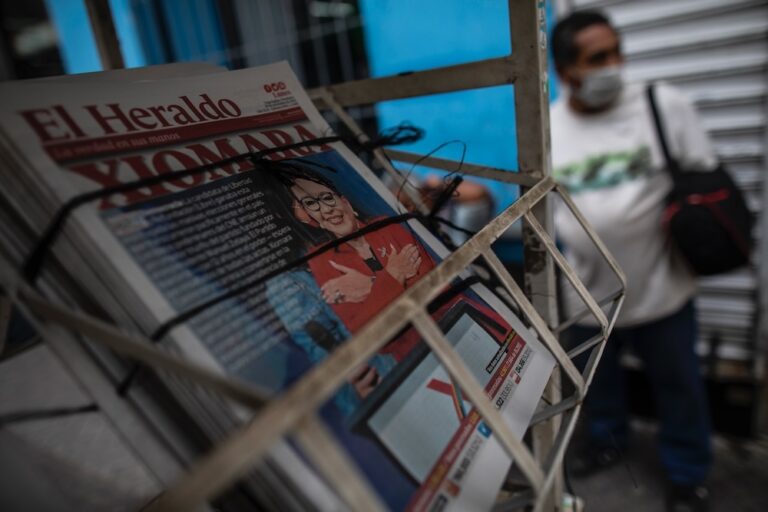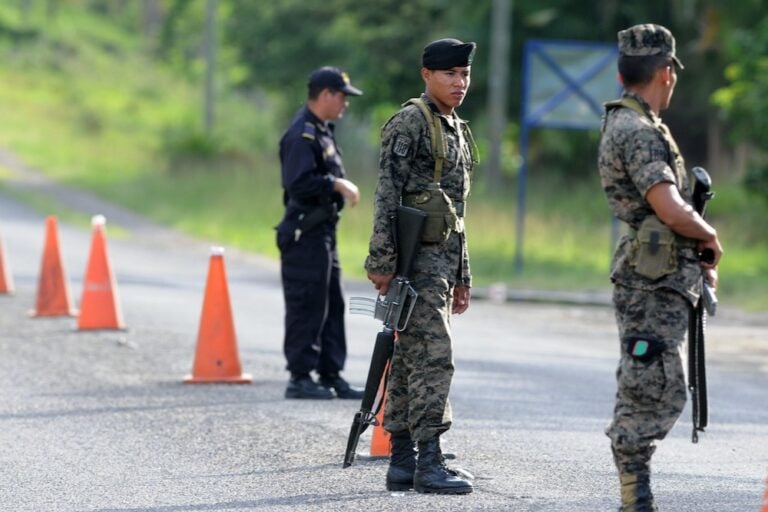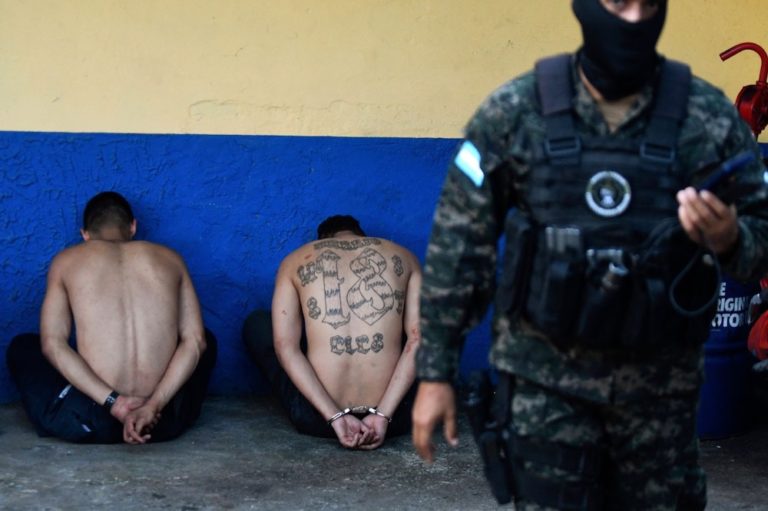(IAPA/IFEX) – The following is a 7 September 2001 IAPA press release: IAPA in Honduras defends professional secrecy, rejects licensing of journalists Free-press organization voices concern over murder of journalist in Guatemala SAN PEDRO SULA, Honduras (September 7, 2001) – Honduran President Carlos Flores pledged to ensure that no limits will be placed on press […]
(IAPA/IFEX) – The following is a 7 September 2001 IAPA press release:
IAPA in Honduras defends professional secrecy, rejects licensing of journalists
Free-press organization voices concern over murder of journalist in Guatemala
SAN PEDRO SULA, Honduras (September 7, 2001) – Honduran President Carlos Flores pledged to ensure that no limits will be placed on press freedom in his country after meeting with an Inter American Press Association (IAPA) delegation in which the issue of a bill to force journalists to disclose their sources of information was raised.
The IAPA delegation, headed by the chairman of the organization’s Committee on Freedom of the Press and Information, Rafael Molina, told Flores of their concern over the legislative bill. While it seeks to make information held by government agencies and banks freely available in order to combat money laundering and drug trafficking, the bill also contains provisions endangering press freedom by limiting journalists’ ability to keep their sources confidential.
Flores gave assurances that he would have any provision that would curtail press freedom removed from the bill, reminding the delegation members that he understood the issue because he had once worked as editor of the daily newspaper La Tribuna.
The IAPA also told the president of its concern over other restrictions on press freedom in the Central American country, which were also discussed in a public forum held last night at the Northern Regional University Center.
During the pubic forum, in which more than 200 journalism students and local community leaders participated, the IAPA raised for discussion a comparative study of Honduran legislation and the principles of the IAPA-sponsored Declaration of Chapultepec, indicating that six of the Declaration’s 10 principles for free speech and press freedom are not complied with in this country. The issue that sparked the most debate was the requirement that journalists must belong to the local Colegio in order to work legally – among the panelists was the Colegio’s president, Elán Reyes.
Molina explained that the IAPA does not oppose membership in associations such as the Colegio that promote higher standards for journalists, but “we do oppose making such membership compulsory, because that violates a fundamental human right, the right to freedom of expression, which belongs to all citizens.” He supported his argument by citing rulings of the Inter-American Court of Human Rights.
The various panelists all supported the Declaration of Chapultepec, on the grounds that there have to be laws allowing all citizens of a country to have access to official sources of information. They also maintained that any insult law making it a criminal offense for a journalist or anyone else to criticize presidents and other senior officials a criminal offense should be repealed.
In addition to Molina, the IAPA delegation was made up of former IAPA President James McClatchy, of McClatchy Newspapers in Sacramento, California, Press Freedom Coordinator Ricardo Trotti and Chapultepec Project Lawyer Jairo Lanao. Its busy schedule also included meetings with the newsroom staff of San Pedro Sula and Tegucigalpa newspapers and with the Journalist Colegio’s leaders.
The delegation had only just arrived in San Pedro Sula when it was informed of the murder on Wednesday, September 5, of Guatemalan journalist Jorge Mynor Armendáriz, the host of a talk show on Radio Amatique in Puerto Barrios, Izabal province, about 186 miles northeast of the Guatemalan capital.
Molina expressed regret at the murder and said he would call on President Alfonso Portillo and other senior Guatemalan officials to order an immediate investigation so that the case might be “solved promptly, with the guilty being brought to justice so as to discourage others from resorting to violence against journalists.”
“We were in Guatemala these days precisely to honor the memory of disappeared journalist Irma Flaquer Azurdia and to put into effect an amicable agreement on the case we signed with the government not to allow impunity to continue besmirching freedom of expression,” Molina said. “There is no doubt that developments such as this new murder require us to remain on the alert – it is an unending battle.”
The IAPA announced that it may send members of its Rapid Response Unit to Guatemala to look into the motives for this week’s murder, with the aim of preventing the perpetrators, as in so many other cases in the Americas, from literally getting away with murder.


